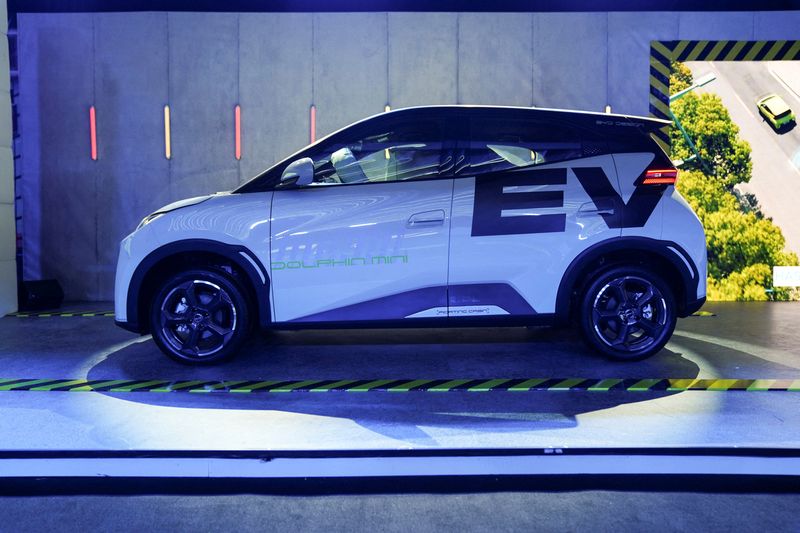Hike tariffs on Chinese EVs, Senate Democrats urge Biden administration By Reuters
[ad_1]

© Reuters. FILE PHOTO: The BYD EV Dolphin Mini is displayed as the Chinese electric-vehicle producer announces the launch of the low-cost EV in Mexico City, Mexico February 28, 2024. REUTERS/Toya Sarno Jordan/File Photo
By David Shepardson
WASHINGTON (Reuters) -Three Senate Democrats from auto manufacturing states on Thursday urged the Biden administration to hike import tariffs on Chinese electric vehicles to address national security risks, the latest push by lawmakers to protect the U.S. auto sector.
“Allowing heavily subsidized Chinese vehicles to enter the U.S. marketplace would endanger American automotive manufacturing,” said the previously unreported letter, seen by Reuters, from Senators Gary Peters and Debbie Stabenow of Michigan and Sherrod Brown of Ohio. “Artificially low-priced Chinese EVs flooding the U.S. would cost thousands of American jobs and endanger the survival of the U.S. automotive industry as a whole.”
Auto industry officials told Reuters earlier Biden is considering hiking tariffs on Chinese EVs and the letter is the latest in growing pressure on the White House to take further steps to prevent Chinese vehicle imports.
The letter to Commerce Secretary Gina Raimondo and U.S. Trade Representative Katherine Tai urged “additional action this year to combat the economic and national security threat presented by China’s efforts to infiltrate our U.S. market.”
USTR and Commerce did not immediately comment.
In recent days, two Republican senators have proposed legislation seeking to hike tariffs on Chinese-made vehicles, though relatively few Chinese vehicles are imported into the United States.
“China’s policies could flood our market with its vehicles, posing risks to our national security,” President Joe Biden said in a statement last week. “I’m not going to let that happen on my watch.”
The Chinese embassy in Washington has rejected calls to hike tariffs saying China’s automobile exports “reflect the high-quality development and strong innovation of China’s manufacturing industry.”
Last week, the Commerce Department said it was opening an investigation into whether Chinese vehicle imports pose national security risks and could impose restrictions due to concerns about “connected” car technology. The White House has not detailed any specific national security incidents to date involving Chinese vehicles but says they could be “exploited in ways that threaten national security.”
The senators urged Commerce to “focus its investigation on the national security threat posed by the potential import of highly connected Chinese vehicles and high-risk China-controlled connected and autonomous technologies.”
A bipartisan group of lawmakers in November urged U.S. Trade Representative Tai to boost tariffs on Chinese vehicles.
Tai said in January the Biden administration is closely reviewing “China’s non-market policies and practices in its automotive industry” and reviewing current tariff levels.
[ad_2]
Source link

© Reuters. FILE PHOTO: The BYD EV Dolphin Mini is displayed as the Chinese electric-vehicle producer announces the launch of the low-cost EV in Mexico City, Mexico February 28, 2024. REUTERS/Toya Sarno Jordan/File Photo
By David Shepardson
WASHINGTON (Reuters) -Three Senate Democrats from auto manufacturing states on Thursday urged the Biden administration to hike import tariffs on Chinese electric vehicles to address national security risks, the latest push by lawmakers to protect the U.S. auto sector.
“Allowing heavily subsidized Chinese vehicles to enter the U.S. marketplace would endanger American automotive manufacturing,” said the previously unreported letter, seen by Reuters, from Senators Gary Peters and Debbie Stabenow of Michigan and Sherrod Brown of Ohio. “Artificially low-priced Chinese EVs flooding the U.S. would cost thousands of American jobs and endanger the survival of the U.S. automotive industry as a whole.”
Auto industry officials told Reuters earlier Biden is considering hiking tariffs on Chinese EVs and the letter is the latest in growing pressure on the White House to take further steps to prevent Chinese vehicle imports.
The letter to Commerce Secretary Gina Raimondo and U.S. Trade Representative Katherine Tai urged “additional action this year to combat the economic and national security threat presented by China’s efforts to infiltrate our U.S. market.”
USTR and Commerce did not immediately comment.
In recent days, two Republican senators have proposed legislation seeking to hike tariffs on Chinese-made vehicles, though relatively few Chinese vehicles are imported into the United States.
“China’s policies could flood our market with its vehicles, posing risks to our national security,” President Joe Biden said in a statement last week. “I’m not going to let that happen on my watch.”
The Chinese embassy in Washington has rejected calls to hike tariffs saying China’s automobile exports “reflect the high-quality development and strong innovation of China’s manufacturing industry.”
Last week, the Commerce Department said it was opening an investigation into whether Chinese vehicle imports pose national security risks and could impose restrictions due to concerns about “connected” car technology. The White House has not detailed any specific national security incidents to date involving Chinese vehicles but says they could be “exploited in ways that threaten national security.”
The senators urged Commerce to “focus its investigation on the national security threat posed by the potential import of highly connected Chinese vehicles and high-risk China-controlled connected and autonomous technologies.”
A bipartisan group of lawmakers in November urged U.S. Trade Representative Tai to boost tariffs on Chinese vehicles.
Tai said in January the Biden administration is closely reviewing “China’s non-market policies and practices in its automotive industry” and reviewing current tariff levels.